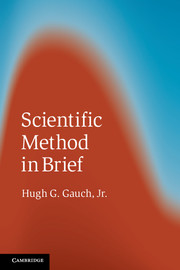Book contents
- Frontmatter
- Contents
- Foreword
- Preface
- 1 Introduction
- 2 Four bold claims
- 3 A brief history of truth
- 4 Science's contested rationality
- 5 Science's presuppositions
- 6 Science's powers and limits
- 7 Deductive logic
- 8 Probability
- 9 Inductive logic and statistics
- 10 Parsimony and efficiency
- 11 Case studies
- 12 Ethics and responsibilities
- 13 Science education
- 14 Conclusions
- References
- Index
5 - Science's presuppositions
Published online by Cambridge University Press: 05 November 2012
- Frontmatter
- Contents
- Foreword
- Preface
- 1 Introduction
- 2 Four bold claims
- 3 A brief history of truth
- 4 Science's contested rationality
- 5 Science's presuppositions
- 6 Science's powers and limits
- 7 Deductive logic
- 8 Probability
- 9 Inductive logic and statistics
- 10 Parsimony and efficiency
- 11 Case studies
- 12 Ethics and responsibilities
- 13 Science education
- 14 Conclusions
- References
- Index
Summary
Essentially, a presupposition is a belief that is required to reach a particular conclusion, and yet it cannot possibly be proved. A presupposition cannot be proved in the ordinary sense of marshaling definitive evidence because presuppositions precede and empower evidence. But that does not necessarily mean that presuppositions are arbitrary and shaky. Rather, presuppositions should be chosen carefully, disclosed, and then legitimated. Because presuppositions are just as necessary as evidence for science to reach any conclusions, a reflective account of science must discuss them.
Although presuppositions and evidence are equally essential, in ordinary scientific discourse, the presuppositions are ignored, whereas the evidence is marshaled. Why? Within the context of ordinary science, the presuppositions needed in science are sensible and unproblematic and are taken for granted. Nevertheless, “Our presuppositions are always with us, never more so than when we think we are doing without them” (O’Hear 1989:54). Again, “Most scientists take for granted their metaphysical assumptions, but they are none the less necessary logically to the conclusions of science” (Caldin 1949:176).
- Type
- Chapter
- Information
- Scientific Method in Brief , pp. 73 - 95Publisher: Cambridge University PressPrint publication year: 2012

